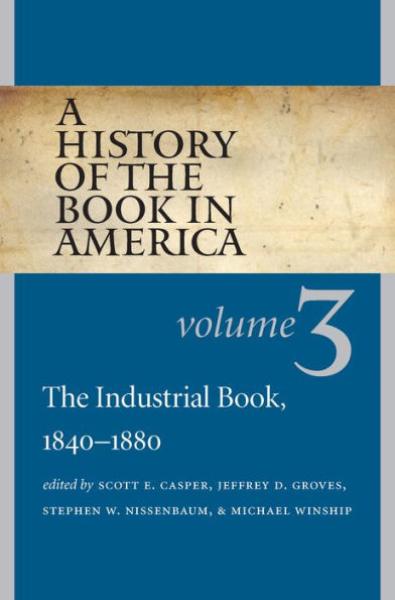Description
Contributors:
Susan Belasco, University of Nebraska
Candy Gunther Brown, Indiana University
Kenneth E. Carpenter, Newton Center, Massachusetts
Scott E. Casper, University of Nevada, Reno
Jeannine Marie DeLombard, University of Toronto
Ann Fabian, Rutgers University
Jeffrey D. Groves, Harvey Mudd College
Paul C. Gutjahr, Indiana University
David D. Hall, Harvard Divinity School
David M. Henkin, University of California, Berkeley
Bruce Laurie, University of Massachusetts, Amherst
Eric Lupfer, Humanities Texas
Meredith L. McGill, Rutgers University
John Nerone, University of Illinois
Stephen W. Nissenbaum, University of Massachusetts
Lloyd Pratt, Michigan State University
Barbara Sicherman, Trinity College
Louise Stevenson, Franklin & Marshall College
Amy M. Thomas, Montana State University
Tamara Plakins Thornton, State University of New York, Buffalo
Susan S. Williams, Ohio State University
Michael Winship, University of Texas at Austin
History of the Book in America: Volume 3: The Industrial Book, 1840-1880
Scott E. Casper is associate professor of history at the University of Nevada, Reno, and author of Constructing American Lives: Biography and Culture in Nineteenth-Century America.
Jeffrey D. Groves is professor of literature at Harvey Mudd College and coeditor, with Scott Casper and Joanne D. Chaison, of Perspectives on American Book History: Artifacts and Commentary.
Stephen W. Nissenbaum is professor of history emeritus at the University of Massachusetts and author of The Battle for Christmas, a finalist for the Pulitzer Prize.
Michael Winship is Howard Regents Professor of English II at the University of Texas at Austin and author of American Literary Publishing in the Mid-Nineteenth Century: The Business of Ticknor and Fields.
David D. Hall is professor of American religious history at Harvard Divinity School.
A model of scholarly publication and institutional cooperation. . . . A timely achievement and a great one. . . . Without university presses, we would still be waiting for HBA.--Journal of Scholarly Publishing
Admirable. . . . Bears reading for new approaches to understanding how print culture affected the lives of Americans in a myriad of social settings and occupations.--Printing History
Generously illustrated, and numerous tables and graphs make statistically dense chapters accessible. . . . Recommend[ed] without hesitation.--Resources for American Literary Study
Provides superb expositions of current scholarship on the history of the book. . . . Places the handsome, often gold-stamped, book-product front and center in a larger print universe operating in many sites. . . . [A] wonderfully rich complexity.--Journal of American History
Succeeds both as a reference work and as a status report on the field's scholarship. . . . Relevant and lucidly written.--Technology and Culture
The depth found in the work edited by Casper, Groves, Nissenbaum, and Winship stands alone in currently available scholarship.--American Reference Books Annual
What the History of the Book series shows so clearly is that the world we know, the communities to which we already belong, are reified and reinforced by books. Such is the incredible and incredibly flexible power of this primitive technology. Behold the book: It is limited but perfect.--Humanities magazine
Product Details
- University of North Carol Brand
- Jun 30, 2014 Pub Date:
- 1469621606 ISBN-10:
- 9781469621609 ISBN-13:
- 560 Pages
- 9.21 in * 6.14 in * 1.25 in Dimensions:
- 2 lb Weight:




